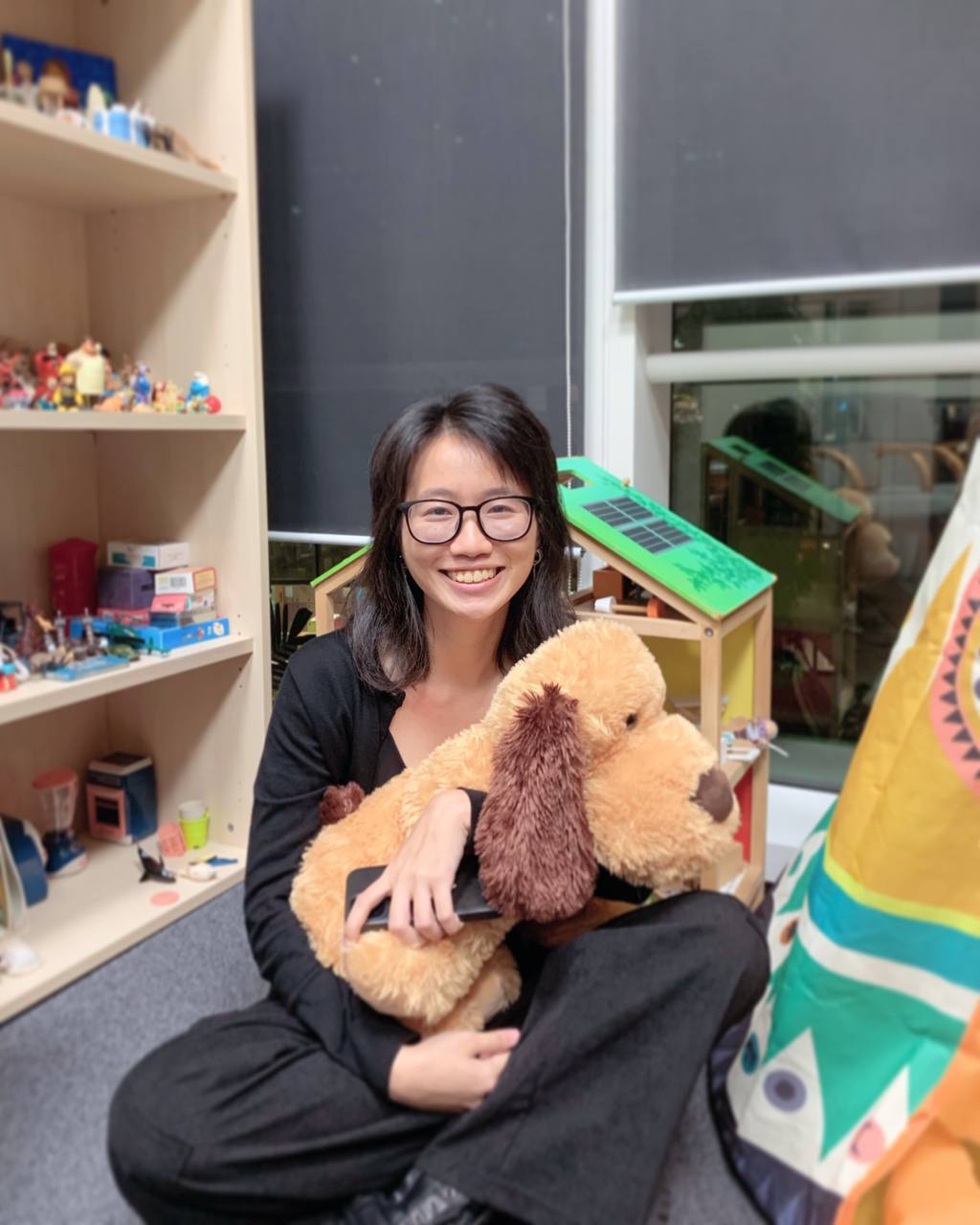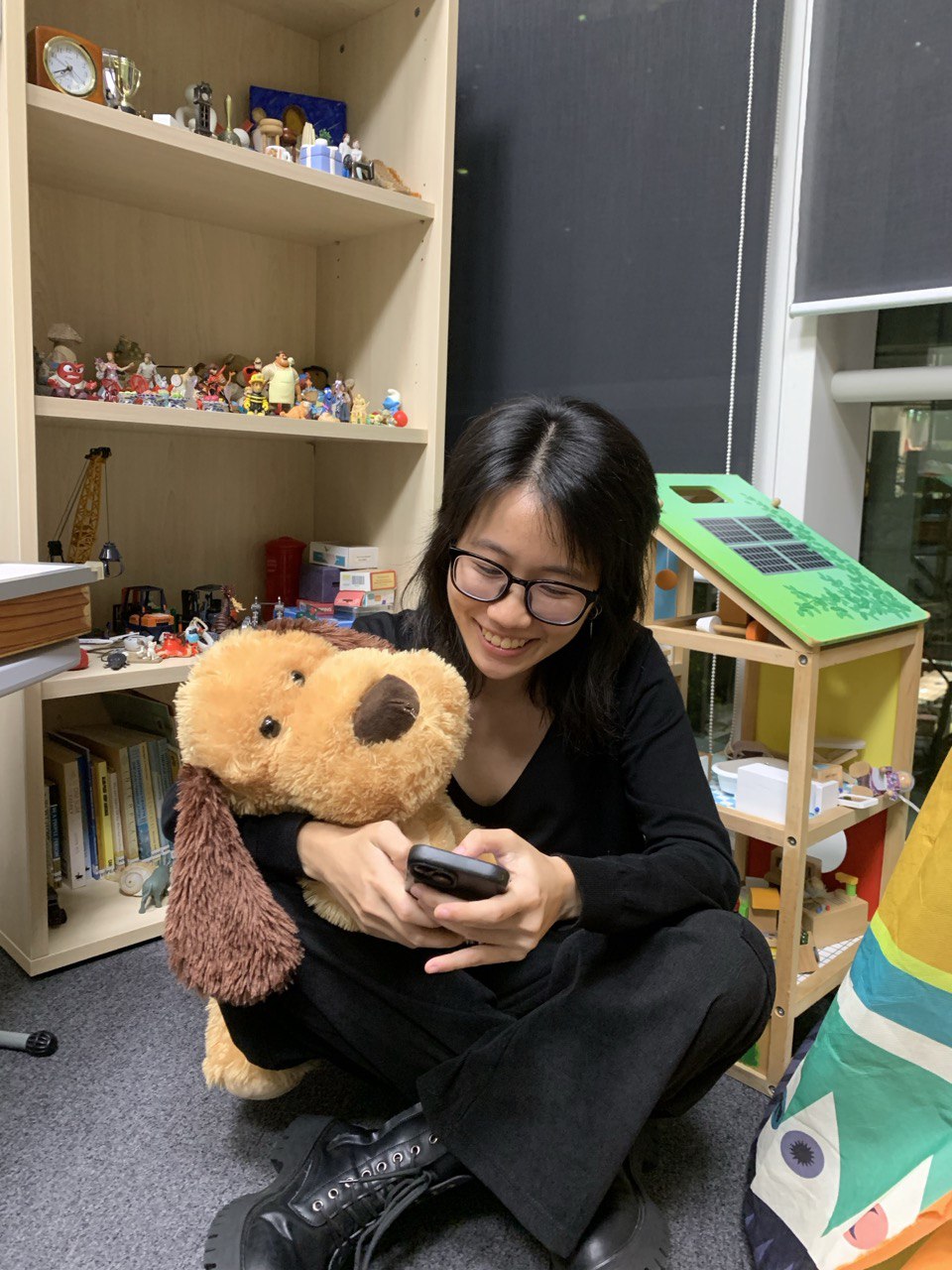In this heartfelt interview, we sit down with CL*, a client at EMCC, to learn about her powerful journey of navigating depression, anxiety, and the challenges of seeking proper treatment.

CL in her regular counselling room at EMCC
Trigger warning: There are mentions of suicide in this article.
Can you share about your initial struggles with your mental health?
I started struggling with my mental health when I was in my teens, and I received a diagnosis at 17 years old. Currently, I’ve been diagnosed with Depression, Anxiety, and Autism.
I often dealt with self-blame and guilt. Even in uncontrollable situations, like bad weather when I was out with friends, I’d blame myself for not anticipating it or failing to plan better. I also struggled with suicidal thoughts and attempted to end my life a few times. Growing up, I felt like each day could be my last. It made me hesitant to form friendships, relationships, or make plans because I wasn’t sure if I’d even survive the day.
Can you tell us more about your experience trying to get the right treatment and medication before coming to EMCC?
I knew I needed help, so I went to a doctor for medication. However, my family refused to let me continue, calling it “poison,” so I had to secretly see the doctor with whatever money I could scrape together.
I stayed with my first doctor for seven years and tried about 10 different medications, but I still struggled with suicidal thoughts. I even developed substance abuse issues during this process. Medication helped with the symptoms, but it wasn’t enough to get past the mental hurdles that I had built up over 10-15 years.
I always felt that talking about my problems would help, but I didn’t have that space when I was younger. So when the medication didn’t improve things, I turned to counselling. I felt like I couldn’t make the decision to end my life without trying all the options first. I was recommended to EMCC by someone who had also been attending counselling there and decided to give it a go.
You mentioned facing a lot of stigma from your family regarding your mental health challenges. Can you share more about that?
When I was 19, I tried telling my mother I wanted to kill myself, but instead of support, she sent me for an exorcism. Talking about my depression was forbidden at home. My mother would tell me to “stop talking nonsense” and claim I was seeking attention. That rejection made me feel even more isolated.
How has counselling at EMCC helped you navigate these challenges and find a path forward?
Counselling has taught me to be kinder to myself. I used to be very harsh and punitive, always blaming myself for everything that went wrong. But my counsellors helped me realise that I wouldn’t judge my friends so harshly, so why was I doing that to myself? It took me three to four years to accept that it’s okay to be kind to myself.
I was also abused as a child, so I had no baseline for what safety feels like. In the beginning, I’d come to my sessions every week crying, terrified of trusting people, even if I knew they were nice to me. I was so scared of being hurt. But over time, I’ve learned to surround myself with people I trust and want in my life. Trusting that others have my best interests at heart was terrifying, but it’s one of the best decisions I’ve made.
Counselling has also helped me rethink my certainty that bad things always follow the good. For so long, I lived expecting the worst, not knowing how to enjoy life. Slowly, I’ve come to believe that maybe good things can happen to me without something terrible waiting around the corner. It has reduced a lot of my stress and fear.
I still have difficult days, and there are times when I tell my counsellor that I want to end things. But they’ve helped me accept that healing isn’t linear. Not every session has to be productive, and relapses don’t mean my life is irredeemable.
I also used to be ashamed of my diagnoses and hide it from everyone, but now I feel that hiding it doesn’t do me any good.

What coping strategies have you developed to manage your mental health struggles?
One of the most important things I’ve learned is to validate my thoughts. Recognising when I’m uncomfortable or need help has allowed me to be more attuned to my needs in the moment. I’ve developed a safety plan and self-soothing techniques, which I keep pinned visibly on my wall for reassurance.
When suicidal thoughts arise, I make a deal with myself: I’ll talk to someone first, and if I feel worse after that, I can think about ending things. Usually, by the end of the conversation, my mind is more regulated.
If I need immediate relief, I use a tapping technique on my leg. I also have affirmations written down, including a list of people who are important to me, like my dog Pepper. My counsellor often reminds me to think of Pepper when I’m sad because she brings me so much joy.
It’s also been important for me to accept that while depression can be excruciating, it isn’t the only thing in my life. Sometimes it feels unbearable, but that’s not all there is.
How is your recovery journey going?
I’d say I started at zero—not even one—but now I’m at about a six, thanks to a combination of counselling and medication. What’s crucial for me now is continuing to hone my self-regulation skills. It’s like a muscle that gets stronger with use.
I’m still damaged in some ways, but I’m learning to remind myself that there are good things to look forward to, even when I can’t see them. I also want to try new experiences to honour the inner child who missed out on so much.
Counselling has been a safe space where I can talk openly, and my counsellor keeps me accountable for my decisions. It has helped me form a useful vocabulary to express my feelings and given me a better understanding of myself. It’s also the most affordable of all my treatments.
Can you share how your relationship with your younger cousin has impacted your own mental health journey?
My cousin, who is eight years younger, struggles with depression and has attempted suicide a few times. I’ve been walking alongside her, trying to help her through it. I used to feel guilty for not reaching out to her sooner, especially since I know what it’s like to feel isolated in an unsupportive family.
I think it’s been helpful for her to see someone who’s been through similar struggles, which makes it feel less scary. Being able to look out for her, and others I love, keeps me alive. It’s something I treasure because I didn’t have that kind of support growing up.
“I’m so sorry this is the way that your depression is being treated, but you don’t have to do this alone. If you’re struggling, you don’t have to worry that people are going to scold you.”
What advice would you give to others who are facing similar challenges, and what are your hopes for the future?
I’d tell them to remember that feelings aren’t permanent—things can get better. It’s okay to feel scared, but you should keep going, even if you’re doing it scared. Another world is possible. The overwhelming feelings won’t last forever, and one day you’ll be in a better position to change your situation.
You’re not alone. There will be friends who care for you, even if you haven’t found them yet. In the meantime, try to find one small thing to look forward to, whether it’s immediate or long term. It could be as simple as treating yourself to kaya toast tomorrow. Hold on to the little things that bring you joy.
I want to see my cousin grow up and start being her own person. My goal is to one day own my own home, and I’m determined to keep working on my mental health and self-regulation skills to make that happen.
If you feel you need professional help and emotional support, please reach out to EMCC. Our counsellors are here to help and support you.
To ensure that our services remain accessible, subsidised counselling is also provided. For more information, click here.
*her initials

